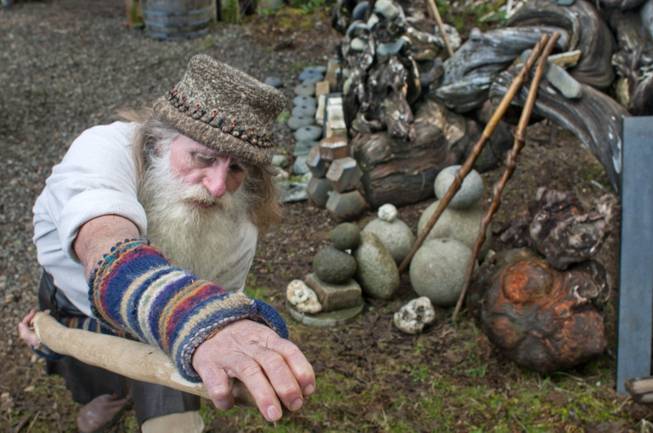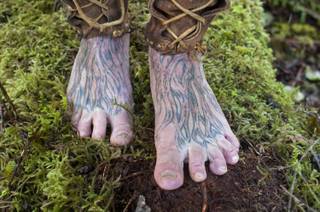
Craig Sailor/Tacoma News Tribune / MCT
Mick Dodge trains with limbs and rocks at his cabin along the Sol Duc River near Forks, Wash., on January 3, 2014.
Saturday, Jan. 18, 2014 | 2 a.m.
TACOMA, Wash. — It’s easy to understand why people occasionally report sightings of Bigfoot in the mossy forests of the Olympic Peninsula. What else could explain a fast-moving biped with long flowing hair climbing trees and plunging into icy streams?
It might be Sasquatch.
But it’s probably Mick Dodge.
Fourteen years ago, Dodge was working as a heavy equipment mechanic at Fort Lewis. Dissatisfied with the 9-to-5 grind, he gave up civilization for a life in the rain forest, living off the land, sleeping in tree stumps and bartering for necessities.
On Tuesday, a television series about Dodge’s unusual lifestyle, “The Legend of Mick Dodge,” will premiere on the National Geographic Channel. The show focuses on his adventures in the mountains and Hoh rain forest.
But that’s only part of who he is, Dodge said.
The former Marine has spent a lifetime maintaining extreme physical fitness. Look beyond Dodge’s impish blue eyes and flowing hair and you’ll see broad shoulders and well-developed muscles.
“That’s my real passion in life,” he said inside a small log cabin on a friend’s forested property along the Sol Duc River near Forks, Wash.
Dodge’s story is full of colorful tales and daring adventures. National Geographic and the production company that made the show did thorough background checks on Dodge, but there are some elements that can come only from him.
Dodge is a native of the Hoh. His great-grandfather was the first in his family to settle there, living in Forks. Mick grew up there and in other places around the country as the son of a career Marine. It was his father, Dodge said, who instilled a lifelong passion for fitness.
Every day at 5 a.m. Dodge’s father would roust his son.
“‘Get your feet on the deck!’ We’d run three 3 miles,” he said. “I wouldn’t wake up until half way through.”
Dodge said he spent six years in the Marines and is a Vietnam veteran. After the Marines, he spent years bumming around the country.
By the late 1990s, Dodge said, he was working at Fort Lewis. He owned a house in Yelm and ran across the base to his job daily. His commute included a swim across the Nisqually River. He kept a stash of dry clothes on the opposite bank.
Eventually, unbeknown to the Army, he lived in camps on the base to shorten his journey, he said. But the job itself hindered the time he wanted to spend in the wild lands and his physical training.
So he quit and moved to the forest.
Dodge created what he calls the Earth Gym. Picture a YMCA in the forest where nature provides most of the equipment for physical training.
Using cargo nets, straps, ropes, stones, limbs, burls and other found and created gear, Dodge teaches his techniques to students who come to him via websites and word of mouth. He eschews the fluorescent-lit confines of urban gyms with their high-tech equipment and linear movements. Instead he uses a connection with nature to teach movement.
Who needs a treadmill when you can run upstream in the Sol Duc River like a human-size salmon? Asked to demonstrate his technique, Dodge gazes out at the rushing waters.
“I’ll jump in the river for you ... in August,” he replies with a laugh.
Dodge is 62 now. Aches and pains can make him cranky. In winter, he enjoys a warm cabin and spending time with a lady friend. But, he said, he can stand only a few days cooped up inside four walls before he feels the need to run. He loves to take to the forest and move as fast as he can, losing himself mentally for hours, sometimes for days.
“I just step out the door and choose a direction,” Dodge said.
A favorite route, he said, takes him through the Hoh, over Stevens Pass, past Lake Chelan, through the Methow Valley and eventually ends in Bellingham.
Along the way, he eats what he finds, Dodge said. From his neck hangs a tooth from a sea lion he found washed up on a beach. He took it after he ate from the remains.
“I’ve honored him ever since,” he said.
Many of his students are vegetarians, and they assume he is one, as well.
“They say they don’t want to hurt animals.,” he said. “What? You hate plants? What I learned is that I’m a hungerarian.”
Dodge said he once ran from Washington to California and back pulling a two-wheeled cart. He flirted briefly with the running community that took off in the 1970s.
Invited to a race in those early days, he said he couldn’t understand why a woman was trying to sell him a bib number. He declined the purchase and ran the race anyway. He was the first to cross the finish line but scurried under the tape, fearful that if he broke it, he might have to pay for it.
“I dodged under it, and I’ve dodged the running crowd from then on,” he said.
Whether walking, running or climbing, Dodge said he usually does it without the benefit of shoes, sandals or any other kind of footwear. In 1991, he made a vow to live barefoot. The move cured his plantar fasciitis, back pain and hammer toes, he said. It also allowed him to interact more intuitively with the natural world.
“Once I put shoes and boots on, I walk with a dominator’s attitude,” Dodge said while wearing knee-high buffalo skin boots with elk horn buttons.
He’s not a barefoot fanatic, he explained. After making the barefoot vow in 1991, “I took off up to the glaciers and almost lost my feet,” Dodge recounted.
And it’s not just Dodge’s feet that go bare. He often trains in the nude or, as he calls it, “nekkid.” Viewers will see some of that in the series — with crucial parts discreetly blurred.
What viewers won’t see on “The Legend of Mick Dodge” is Dodge wearing plastic garments. Instead, he wears buckskins on TV. While they are the clothes he wears in dry weather, Dodge often dons artificial material for rain protection.
“The art of living out here is the art of staying dry,” he said.
But the show’s crew often shot scenes out of sequence. And the occasional appearance of plastic would have ruined the continuity of the episode. So, he got wet. And annoyed.
It wasn’t the only conflict Dodge had with the show’s producers, the Seattle-based Screaming Flea Productions — creators of “Hoarders.” As with many reality shows, Dodge was given a script with lines to say. Dodge protested.
“I wouldn’t say those things,” he recounted.
In one episode, the producers wanted him to hunt a bear. Dodge refused — he no longer hunts.
It became such a point of contention between Dodge and the suits in New York that he sent a videotaped message of protest to the top brass at the National Geographic Channel, he said. The execs relented. The bear-hunting episode turned into a mushroom-hunting episode instead. By the end of the 12th episode, the crew would just follow Dodge and capture his natural dialogue.
“It would be easier and faster to give him lines to say. But he’s not an actor. He’s a real person,” said Liza Keckler, vice president of development at Screaming Flea.
But viewers should still not expect a strict documentary style. Each show has a story line — a mission or goal. Some scenes are recreated and lines repeated for better sound.
Months after filming was complete, it’s still a sore point with Dodge. As he stood in his cabin and recounted some of the difficulties, Keckler was standing nearby.
“You said I could tell him anything I wanted to,” Dodge told her.
“And I’m not stopping you,” Keckler replied.
Keckler first became aware of Dodge when she saw video of him shot by Michele Gomes and Jenny Ting of Interchange Media.
“The first tape I saw was him climbing a tree and singing a song,” she said. “I thought, ‘Who the heck does that?’”
Dodge is learning, he said, about the techniques behind television, but he maintains strong ethical standards and wants the show to reflect reality. He has praise for the crew that followed him tirelessly for weeks in the forest, climbing trees with him and enduring the same hardships.
Before he agreed to being filmed, Dodge led the crew through his Earth Gym training.
“You hazed us,” Keckler told Dodge with a laugh.
By the end of the filming, the crew had grown beards and they were walking barefoot.
Keckler said the series will expose viewers to Dodge’s sense of humor, the beauty of the Hoh rain forest and some unique survival tips.
“It’s nothing that Bear Grylls will teach you,” she said.
Though he was paid to appear in the series, Dodge said he turned his salary over to a nonprofit, Olympic Mountain EarthWisdom Circle. Dodge doesn’t use money, he said, instead choosing to barter for everything. He doesn’t own a car, cellphone or TV. He hasn’t seen himself on TV and doesn’t want to.
Dodge said he makes most of his own clothing. On this day, he was wearing a leather kilt and a knit cap.
Whether training or on a wilderness journey, Dodge relies on just three types of equipment: sticks, stones and sacks.
One of those sacks makes an episode. Wanting to scatter the ashes of his father on Blue Glacier in Olympic National Park — he’s still not quite sure whether that was legal — he filled a leather sack with his father’s remains and his military medals. But a canoe tipping dunked the sack in a lake. The next day, Dodge discovered, his father had turned into a lump of concrete.
Dodge wants people to know he’s not some a survivalist or a strange hermit living in logs, or a survivalist.
“I’m a thrillvilist,” he clarified.
Some have likened Dodge to a Forrest Gump-type character. It’s a comparison he doesn’t mind.
“I love people. I love song and dance,” he said and then broke into a Scottish Highland-style song he wrote.
It’s harder now, Dodge said, to find the unfenced lands of his youth. He tries to play by the rules when it comes to making camps in national parks and forests, but eventually, “Guns and badges are going to show up and tell you to move on.” He supports the idea of preserves but doesn’t like to be charged to use them.
Though Forks has seen an economic boost from the popularity of the vampire-werewolf-themed “Twilight” saga, it remains a logging town. And local loggers aren’t quite sure what to make of Dodge, he said. Though he espouses a back-to-nature ethos, he’s not against logging.
“Our problem,” he said, “is the demand and the desire (for material goods). Not loggers.”
Dodge sees a schism between the city and the wild lands, and it’s only getting worse.
“Roads are walls,” he said. “The guards are all the people riding their cars and machines on it.”
The movement and habits of city life are pulling people farther away from nature, Dodge said. And in turn, people fear nature. It’s something he has to fight in the students who come to learn from him.
“Their biggest fears are cold, wet and where they’re going to sleep,” Dodge said. “Fear is such a beautiful thing if you turn it into excitement.”


Join the Discussion:
Check this out for a full explanation of our conversion to the LiveFyre commenting system and instructions on how to sign up for an account.
Full comments policy